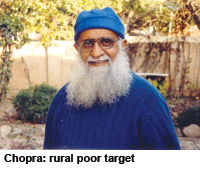 Ravi Chopra is the founder-director of People’s Science Institute (PSI), Dehradun. Promoted in 1988, PSI is on a humanitarian mission to disseminate the benefits of science and technology to India’s oft-forgotten rural poor, especially in the states of Uttarakhand, Himachal Pradesh and western Orissa. Today, the institute is nationally and internationally recognised for devising ingenious solutions to people’s problems. A highly qualified and experienced engineer and technologist, Dr. Chopra is also trustee of the Himalaya Foundation.
Ravi Chopra is the founder-director of People’s Science Institute (PSI), Dehradun. Promoted in 1988, PSI is on a humanitarian mission to disseminate the benefits of science and technology to India’s oft-forgotten rural poor, especially in the states of Uttarakhand, Himachal Pradesh and western Orissa. Today, the institute is nationally and internationally recognised for devising ingenious solutions to people’s problems. A highly qualified and experienced engineer and technologist, Dr. Chopra is also trustee of the Himalaya Foundation.
Newspeg. On June 17, PSI signed a memorandum of understanding (MoU) with the government of Himachal Pradesh to introduce the institute’s System of Crop Intensification to improve productivity of foodgrains statewide, enabling 25,000-30,000 farmers to benefit. The Himalaya Foundation is also set to expand its fellowship progra-mme from four per year to 30, under which idealistic youth are trained to become agents for social change.
History. An alumnus of IIT-Bombay and Steven’s Institute of Technology, New Jersey, USA, Dr. Chopra returned to India in 1981 to work as a research fellow at the Centre for Science and Environment, Delhi, of which he was appointed director in 1984. In 1988, he resigned his position and together with his wife Joanna — co-founder and executive director of Latika Roy Foundation, Dehradun (see EW June, p. 70) — relocated to the foothills of the Himalayas and promoted PSI, to help the rural poor steer a path out of poverty.
Achievements. Under the Sukha Mukti Abhiyan programme of the Palamau district administration, PSI has been instrumental in establishing village water councils (pani panchayats) for rural communities. These councils have built 143 earthen dams facilitating irrigation of 1,800 hectares in the district. Moreover in 24 villages, Mahila Vikas Sangathans, promoted by PSI, have established plant nurseries which have afforested 110 hectares of barren land.
Future plans. This year PSI has replicated its Gram Swarajya drought-proofing model in the Bundelkhand region to involve rural citizens in development plans for villages, gain access to funds and entitlements due to them under government grants, and facilitate execution of projects. Also on this year’s PSI agenda is expansion of its programme for regenerating springs and small streams in Sikkim, even as its Environment Quality Monitoring Group will replicate a community-based fluorosis mitigation programme in Madhya Pradesh.
PSI, which currently has 40 full-time employees on its payroll, is poised for sustained organic growth. “We have developed a robust second rung of leadership and in the next few years we will focus on nurturing and strengthening the next generation of leaders,” says Chopra.
Right on!
Payal Mahajan (Gurgaon)